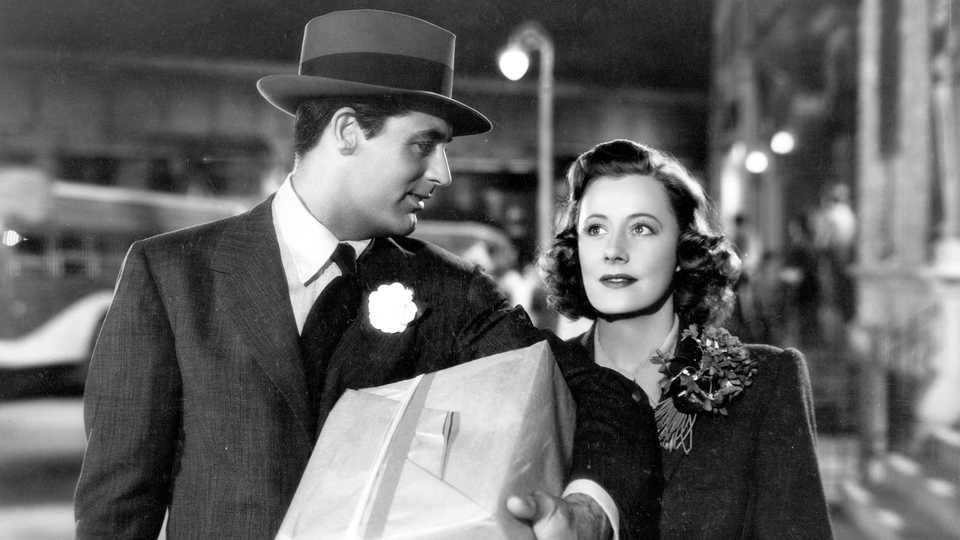Penny Serenade

Cary Grant and Irene Dunne play a couple who endure a series of tragedies attempting to start a family. The film proffers romance, humor and pathos. But not subtlety. Never subtlety.
Told in flashback, Grant spies Dunne working as a salesgirl in a record shop. At closing, he leaves with a stack of records and walks Dunne home. Arriving at her house, he confesses he doesn’t own a record player. “Then why did you buy—oh!” says Dunne.
Fast forward and the two are dating. Eating beachside, the visage of Grant, clad in a sweatsuit and sporting mussed hair, proves jarring. The two break open fortune cookies, with Dunne’s reading “You will get your wish—A BABY.”
At first, I found Grant’s attraction to Dunne hard to swallow. She’s seven years his senior. But Grant plays a character who thinks nothing of taking advances on his salary or pouncing on a job in another country without consulting Dunne. He’s a man-child. Thus, his attraction to the more mature Dunne makes sense.
Back to the story, Grant and Dunne marry and the aforementioned job sees the now pregnant Dunne join Grant in Japan. An earthquake strikes. With Dunne inside, the couple’s house shakes itself apart. Debris falls on the aforementioned fortune predicting a baby. Each spurt accompanied by an ominous orchestra horn swell.
Dunne survives but loses the baby and her ability to bear future children. As she convalesces, a nurse parks a cot of newborns outside her door.
Dunne and Grant move back stateside. He’s quit his salaried job to resurrect a small-town paper. They move into a creaky apartment over the paper’s headquarters. A bizarre painting of a baby adorns the paper’s entrance. The apartment sports peeling paint and jammed doors, but comes with a furnished nursery.
The couple alight on adoption, thinking they can “Just walk in and help yourself to what you want. There’s no guesswork!” Reality comes as a blow. The adoption ward matron points out, “Real parents, wait almost a year.” But no sooner have Grant and Dunne resigned themselves, then the matron calls with news of a child. Another couple should have first choice, “But somehow, I feel she’s exactly the child for you.”
Grant pouts—he wanted a boy—but they return home that evening with a newborn girl. Now the film attempts screwball comedy, with Grant unable to work light switches or an alarm now that he’s a father. Later that night, with the baby crying, Grant, clean shaven with perfect hair, stands helpless, ordering Dunne to “Do something!”
Next, it’s Dunne’s turn to flounder when she attempts to bathe the baby in front of the paper staff. She’s terrified of hurting the child, a point hammered home by one of the staff cracking peanuts in the background.
The pair persevere and the child grows to a toddler. But the paper folds, leaving the couple broke, and the agency must reclaim the child. Grant goes before a judge with an impassioned plea to keep his daughter. This scene proves a favorite of Grant impressionists.
Fast forward and the toddler is now walking and talking. She’s meant to seem precocious but flashes a creepy smile that unnerves more than charms. The film proffers a cloying school performance of the nativity before cutting to the adoption ward matron, reading a letter from Grant and Dunne telling of how their daughter succumbed to a “sudden brief, hopeless, illness.”
At least they spared us the on-screen death.
Grant walks out, unable to cope with his grief. Understandable, but it’s evocative of the same immature, self-centered behavior he’s displayed through the entire film. Fatherhood has taught him nothing.
But another call from the nursery head, saying she has “another special baby,” supplies a preposterous happy ending.
I cannot recommend this film. Grant emotes in his now-signature scene, but his character lacks any resonant arc and never charms. The blatant attempts at emotional manipulation betray the artifice and keep the emotional stakes at arm’s length, precluding any sense of catharsis. This renders the film an exercise in tedium as it trots out one sob-story plot twist after another. It didn’t tug at my heartstrings. It tried my patience.